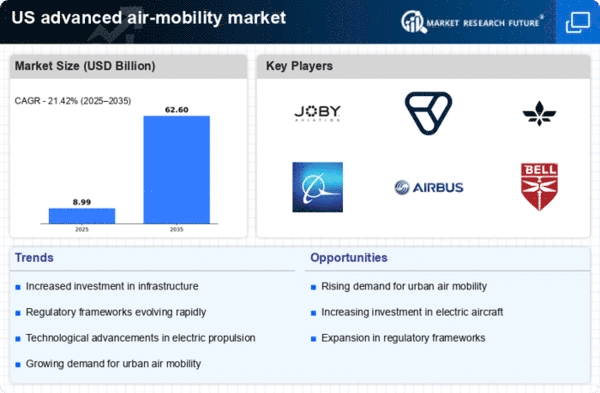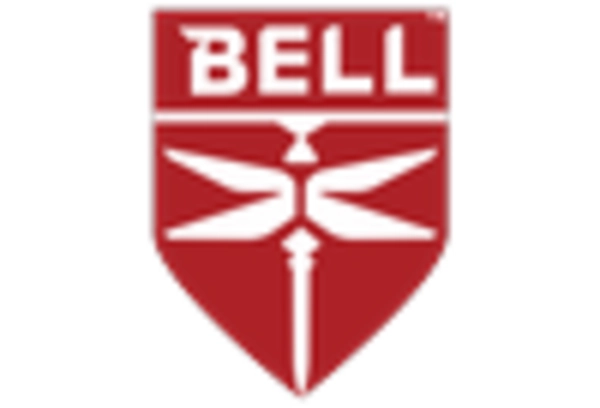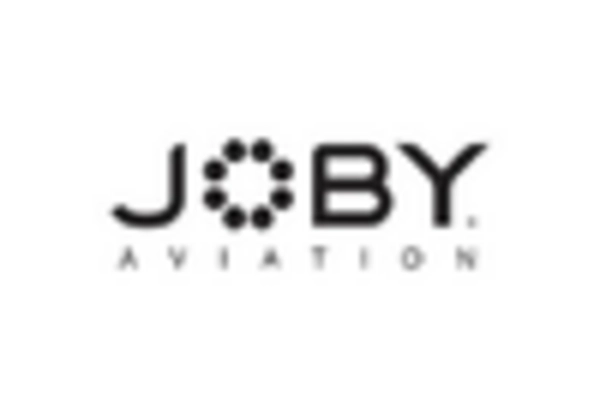Government Initiatives and Support
Government initiatives and support play a crucial role in shaping the advanced air-mobility market. Federal and state governments are actively promoting policies that encourage the development and integration of aerial mobility solutions. In 2025, several states have launched pilot programs to test eVTOL operations, with funding exceeding $500 million allocated for infrastructure development. These initiatives aim to create a regulatory framework that facilitates the safe operation of advanced air-mobility vehicles. Additionally, government support for public-private partnerships is likely to enhance collaboration between stakeholders, fostering innovation and accelerating market growth. The proactive stance of government entities indicates a commitment to integrating advanced air-mobility solutions into the broader transportation ecosystem, making it a vital driver for the market.
Growing Urbanization and Congestion
The increasing urbanization in the US is driving the demand for advanced air-mobility market solutions. As cities expand, traffic congestion becomes a pressing issue, leading to longer commute times and reduced productivity. The advanced air-mobility market offers a potential solution by providing aerial transportation options that can bypass ground traffic. According to recent studies, urban areas are projected to house over 80% of the US population by 2050, intensifying the need for innovative transportation solutions. This trend suggests that urban planners and policymakers are likely to invest in advanced air-mobility infrastructure to alleviate congestion, thereby fostering growth in the market. The integration of aerial vehicles into urban transport systems could significantly enhance mobility, making it a crucial driver for the advanced air-mobility market.
Investment in Research and Development
Investment in research and development (R&D) is a critical driver for the advanced air-mobility market. The US government, alongside private sector players, is allocating substantial funds to develop new technologies and improve existing ones. In 2025, federal funding for aerospace R&D is expected to exceed $1 billion, reflecting a strong commitment to advancing air-mobility solutions. This financial backing is likely to accelerate innovation in electric vertical takeoff and landing (eVTOL) aircraft, autonomous systems, and air traffic management technologies. As advancements are made, the market is expected to expand, attracting more stakeholders and fostering competition. The emphasis on R&D not only enhances the capabilities of aerial vehicles but also addresses safety and regulatory challenges, making it a pivotal factor in the growth of the advanced air-mobility market.
Technological Integration with Smart Cities
The integration of advanced air-mobility solutions with smart city initiatives is becoming a pivotal driver for the market. As cities in the US adopt smart technologies to enhance urban living, the potential for aerial mobility solutions to complement these systems is increasingly recognized. The advanced air-mobility market stands to benefit from the synergy between aerial vehicles and smart infrastructure, such as traffic management systems and energy-efficient grids. By 2025, it is anticipated that over 50 US cities will implement smart city technologies, creating opportunities for advanced air-mobility solutions to integrate seamlessly into urban transport networks. This alignment not only enhances operational efficiency but also promotes sustainability, making it a compelling factor for growth in the advanced air-mobility market.
Public Acceptance and Demand for New Mobility Solutions
Public acceptance of new mobility solutions is emerging as a significant driver for the advanced air-mobility market. As consumers become more aware of the benefits of aerial transportation, including reduced travel times and environmental sustainability, demand is likely to increase. Surveys indicate that approximately 60% of urban residents in the US express interest in using air taxis for short-distance travel. This growing enthusiasm suggests a shift in consumer behavior, which could lead to increased investment and development in the advanced air-mobility market. Furthermore, as companies begin to demonstrate the safety and reliability of their aerial vehicles, public confidence is expected to rise, further propelling market growth. The interplay between consumer demand and technological advancements may create a robust ecosystem for the advanced air-mobility market.

















